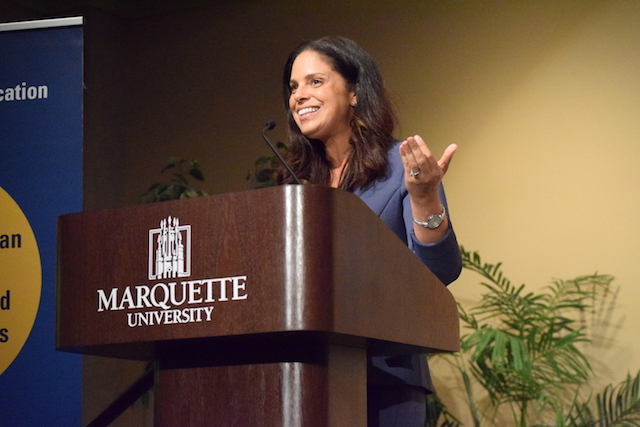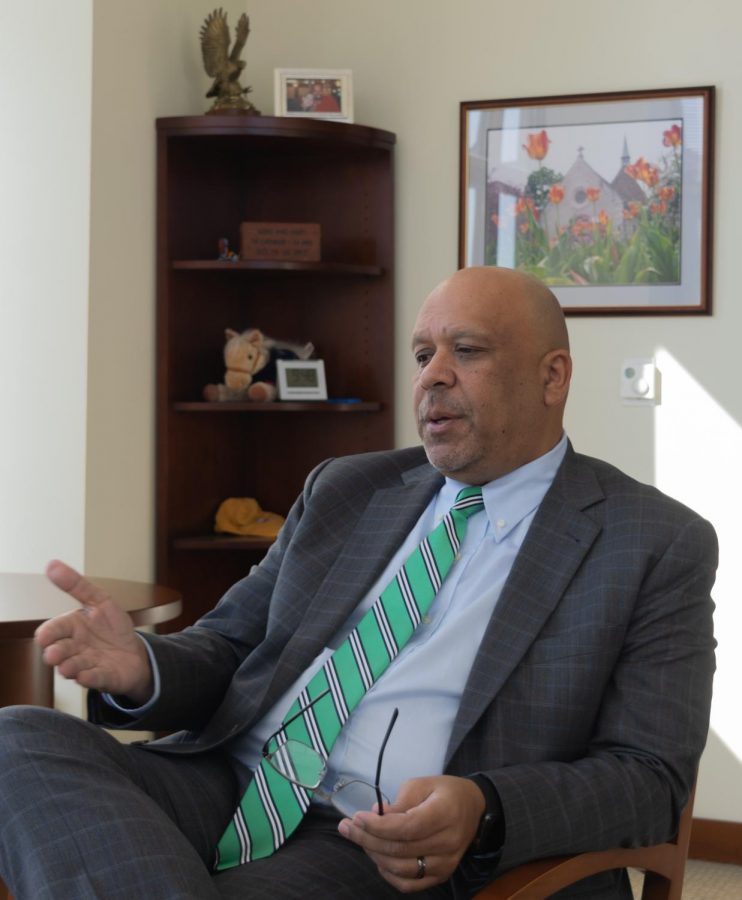Visiting journalist Soledad O’Brien moderated the President’s Panel on Diversity, Equity and Inclusion the afternoon of Feb. 26 at the Law School. During the panel, Marquette student panelists shared their experiences as people of color on campus. The students shared stories of enduring not only micro-aggressions, but blatant acts of racism.
Events like this one provide an opportunity to facilitate important conversations about race at Marquette, and University President Michael Lovell’s willingness to discuss the topic is a step in the right direction. But more must be done to combat racism on campus than occasional events and conversations.
The student panelists discussed often feeling isolated as people of color. In fact, nearly 69 percent of Marquette’s undergraduate students are white, according to data from the Office of Institutional Research and Analysis. About 4 percent of undergraduate students are black.
Approximately 78 percent of full-time faculty members are white, while about 4 percent are black, according to the same data.
The experiences and feelings addressed by the student panelists must spark action by university administrators. Marquette needs to take a uniform stance regarding diversity on campus by intentionally implementing online training programs, diversity seminars, required interactive events — or a combination of these options — to promote student, staff and faculty awareness about race issues. A plan needs to be put in place and action needs to be taken.
Before students begin their freshman year, they are required to take online courses about alcohol awareness and sexual assault. Once students come to campus, they are mandated to attend workshops like Red Watch Band training for further alcohol awareness training. Students are also educated on sexual assault and university resources at in-person training events. Marquette should exhibit this same commitment to educating students about race and diversity on campus.
Oftentimes, when there are events about race and diversity on campus, they only reach a certain audience. The people who attend are people who choose to go — usually, these are people who already care about the issues discussed. These important conversations need to involve all students, staff and faculty, including those who may perpetuate racism at the university and may not attend these conversations voluntarily.
If Marquette makes diversity training mandatory for students, staff and faculty, this would help ensure that university community members are receiving vital information about how to interact with others. Some students may come from backgrounds where they rarely encountered individuals with different ethnicities. This acknowledgement comes with an obligation for the university to educate incoming and current students on race issues. Training could also help make students, staff and faculty of color feel more accepted by their fellow community members.
The university seems to have many forums and discussions talking about race relations on campus, but the administration has failed to follow through with actions. It is extremely important that all students, staff and faculty — no matter their race or ethnic background — feel like they are listened to and are a valuable part of campus, and that requires intentional actions by Marquette to prevent racism on campus.
If race issues do arise, the university must be transparent and address the issues head-on. Students, staff and faculty should know that instances of racism and discrimination aren’t being pushed off to the side. However, the university’s approach should not be solely reactive. Rather, it should be proactive.
Holding discussions about racism on campus is crucial, but the issue warrants more than just talk. Students, staff and faculty should feel comfortable and confident that Marquette is a place where racism is not tolerated, but more than that, that racism is being prevented on the front end.
Administrators must reserve the time and resources to develop a uniform, action-oriented approach to help facilitate conversation and education about race on campus. A combination of an online training session, in-person seminar course and/or mandated events about race could be extremely beneficial. There is something very valuable about having discussions with people that are different than oneself.
The university needs to take prompt action to ensure that students, staff and faculty of color are not forced to endure continued acts of racism on campus. Marquette administrators must work together to develop a coordinated approach to educate incoming and current students, staff and faculty about race issues and respectfully interacting with others in a diverse community.







VirDella Magee • Jun 1, 2020 at 7:20 am
I have an incoming Freshmen and this article concerns me greatly. Has Marquette taken any steps to address issues of racism, as suggested in the article? Is racism still a problem for minorities?